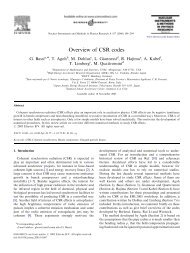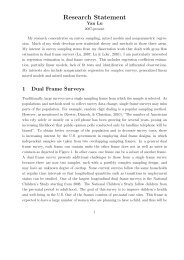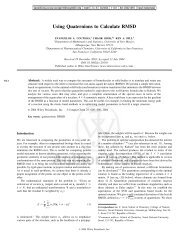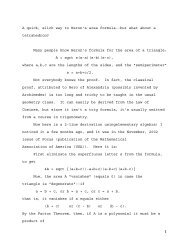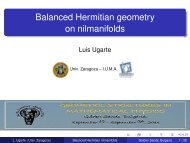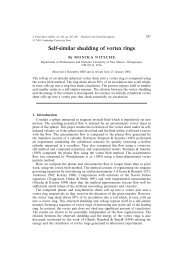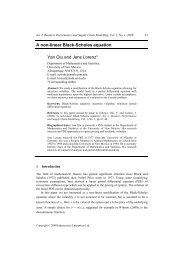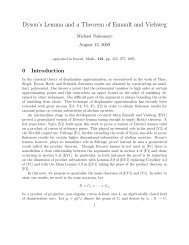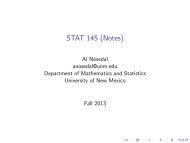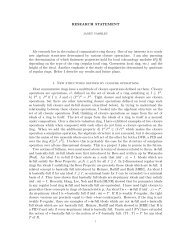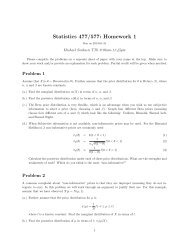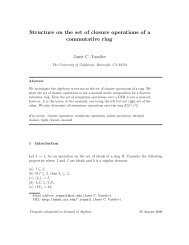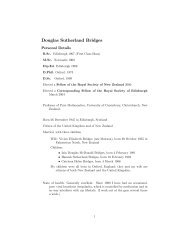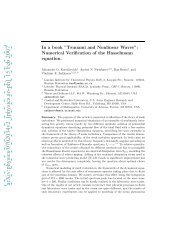OEO Office of Equal Opportunity - Department of Mathematics and ...
OEO Office of Equal Opportunity - Department of Mathematics and ...
OEO Office of Equal Opportunity - Department of Mathematics and ...
You also want an ePaper? Increase the reach of your titles
YUMPU automatically turns print PDFs into web optimized ePapers that Google loves.
290 ARTS AND SCIENCES<br />
428. Sociology <strong>of</strong> Mexican Americans. (3) Gonzales,<br />
Lopez<br />
The historical, comparative <strong>and</strong> contemporary study <strong>of</strong> the<br />
Mexican American in the U.S. Race <strong>and</strong> ethnic relations<br />
theories <strong>and</strong> the Chicano Movement.<br />
Prerequisite: 101. {Offered upon dem<strong>and</strong>}<br />
430. Ideology <strong>and</strong> High Culture. (3) Huaco<br />
Theory <strong>of</strong> ideology (Marx, Lukacs, Mannheim). Sociology <strong>of</strong><br />
literature, art, philosophy. {Offered upon dem<strong>and</strong>}<br />
*441. Complex Organizations. (3) Burris<br />
Structure <strong>and</strong> functional dynamics <strong>of</strong> formal organizations;<br />
the role <strong>of</strong> bureaucracy in modern social organization.<br />
Prerequisite: 101. {Offered upon dem<strong>and</strong>}<br />
*445. Occupations <strong>and</strong> Pr<strong>of</strong>essions. (3) Burris, Hood<br />
Comparative studies <strong>of</strong> occupational subcultures; patterns <strong>of</strong><br />
interaction <strong>and</strong> social norms in relations among colleagues<br />
<strong>and</strong> with clients; recruitment, mobility <strong>and</strong> the process <strong>of</strong><br />
pr<strong>of</strong>essionalization.<br />
Prerequisite: 101. {Offered upon dem<strong>and</strong>}<br />
*450. Urban Society in Latin America. (3) Valdes<br />
Causes, processes <strong>and</strong> consequences <strong>of</strong> urbanization from<br />
Spanish colonial times to present; changes in class, status,<br />
power, population growth <strong>and</strong> social relations in urban society.<br />
Prerequisite: 350. {Offered upon dem<strong>and</strong>}<br />
*451. Population. (3)<br />
The composition <strong>of</strong> populations; fertility, mortality, migration;<br />
sources <strong>and</strong> evaluation <strong>of</strong> demographic data.<br />
Prerequisite: 101. {Offered upon dem<strong>and</strong>}<br />
*461. Social Dynamics <strong>of</strong> Global Change. (3) Schrank,<br />
Tiano<br />
A sociological perspective on economic, political <strong>and</strong> social<br />
trends worldwide. Implications <strong>of</strong> global change for individuals,<br />
organizations <strong>and</strong> societies. {Offered upon dem<strong>and</strong>}<br />
471. Contemporary Sociological Theory. (3) Burris,<br />
Huaco, Tiano<br />
Comparative analysis <strong>of</strong> major contributions to sociological<br />
theory in the 20th century: Functionalism, Phenomenology,<br />
French Structuralism, Analytical Marxism.<br />
Prerequisite: 101. {Fall, Spring}<br />
*478. Seminar in International Studies. (3)<br />
(Also <strong>of</strong>fered as ECON, MLNG 478.) Designed to provide<br />
seniors from several disciplines an opportunity to apply an<br />
international perspective to their undergraduate training.<br />
Each student presents a term project drawing upon his or<br />
her major disciplinary background <strong>and</strong> related to international<br />
concerns. Open only to seniors. {Offered upon dem<strong>and</strong>}<br />
481L. Research Methods in Sociology. (4) Coughlin,<br />
Roberts, St. George<br />
Use <strong>of</strong> the computer as a tool <strong>of</strong> social research; utilization <strong>of</strong><br />
data archives; problems <strong>of</strong> research design, instrumentation<br />
<strong>and</strong> analysis <strong>of</strong> empirical data.<br />
Prerequisite: 381. Three lectures, 1 hour lab. {Fall, Spring}<br />
*484. The Cuban Revolution, 1959 to Present. (3) Valdes<br />
(Also <strong>of</strong>fered as HIST 475 <strong>and</strong> 655.) Background to revolution<br />
since 1898; emphasis on period since 1959. {Offered<br />
upon dem<strong>and</strong>}<br />
488. Field Observation <strong>and</strong> Experience. (1-4) Coughlin,<br />
Rack<br />
A field placement arrangement for students in the criminology,<br />
Peace Studies, <strong>and</strong> social welfare concentrations. Participant<br />
observation in local agencies <strong>and</strong> sociological analysis <strong>of</strong><br />
this experience.<br />
Prerequisites: core courses in deviance/criminology, Peace<br />
Studies, or social welfare <strong>and</strong> permission <strong>of</strong> instructor. {Fall,<br />
Spring}<br />
Arrangements normally made at least one semester in<br />
advance.<br />
491. Directed Study in Criminology. (1-3 to a maximum<br />
<strong>of</strong> 6) ∆<br />
Tutorial arrangement for investigation <strong>of</strong> selected issues in<br />
criminology. Specific arrangements must be made with a<br />
member <strong>of</strong> the sociology faculty responsible for supervising<br />
the work.<br />
499. Senior Honors Thesis. (3)<br />
For departmental honors students only. By arrangement with<br />
department Honors <strong>and</strong> Awards Committee <strong>and</strong> approval <strong>of</strong><br />
the chairperson.<br />
500. Classical Sociological Theory. (3) Burris, Huaco,<br />
Lopez<br />
Advanced study <strong>of</strong> selected classical theorists.<br />
503. Political Sociology. (3) Coughlin, Fiala, Wood<br />
Review <strong>of</strong> the field <strong>of</strong> political sociology. Focus is on the<br />
character <strong>of</strong> the state, state expansion, states <strong>and</strong> organized<br />
conflict <strong>and</strong> forms <strong>of</strong> state organization <strong>and</strong> ideology.<br />
504. Deviance. (3) Broidy<br />
Survey <strong>of</strong> major research traditions for each theory <strong>of</strong> deviance<br />
<strong>and</strong> policy implications <strong>of</strong> deviance research.<br />
505. Complex Organizations. (3) Schrank<br />
Survey <strong>of</strong> the empirical literature <strong>and</strong> theory related to<br />
complex organizations. Attention to organizational structure,<br />
conflict, problem solving, development <strong>and</strong> ecology.<br />
506. Seminar: Comparing Nations. (3) Coughlin, Fiala,<br />
Schrank, Valdés<br />
The demography, social structure <strong>and</strong> value systems <strong>of</strong> the<br />
developed <strong>and</strong> developing societies. The particular theme<br />
<strong>and</strong> concerns <strong>of</strong> the course will vary each time <strong>of</strong>fered.<br />
507. Topics in Sociological Theory. [Sociological Theory:<br />
Selected Topics.] (3, no limit) ∆<br />
508. Latin American Development <strong>and</strong> Planning. (3)<br />
Valdes<br />
(Also <strong>of</strong>fered as CRP, LTAM 578.) Interdisciplinary seminar<br />
focusing on area topics in Latin American planning, development<br />
<strong>and</strong> urbanization. It is the core course for the LAS/<br />
MCRP dual-degree program.<br />
509. Gender <strong>and</strong> International Development. (3) Tiano<br />
Focus on women in Africa, Asia <strong>and</strong> Latin America, exploring<br />
their historical <strong>and</strong> current circumstances in light <strong>of</strong> the<br />
changing global political-economy.<br />
510. Social <strong>and</strong> Political Movements. (3) Gonzales,<br />
Wood<br />
Examination <strong>of</strong> historical, theoretical <strong>and</strong> empirical materials<br />
on the character <strong>and</strong> dynamics <strong>of</strong> social <strong>and</strong> political<br />
movements. Includes consideration <strong>of</strong> the global context <strong>of</strong><br />
contemporary social <strong>and</strong> political movements.<br />
512. Ideology <strong>and</strong> High Culture. (3) Huaco<br />
Theory <strong>of</strong> ideology (Marx, Lukacs, Mannheim). Sociology <strong>of</strong><br />
literature, art, philosophy.<br />
513. Constructing <strong>and</strong> Analyzing Contemporary<br />
Sociological Theory. (3) Fiala, Huaco<br />
Survey <strong>of</strong> contemporary theory, with a focus on constructing<br />
theory. Includes analysis <strong>of</strong> functional, interactionist, institutional<br />
<strong>and</strong> world-systems theory.<br />
514. 20th Century European Theory. (3) Huaco<br />
(Also <strong>of</strong>fered as PHIL 514.) Analytical Marxism, Nietzsche,<br />
Spengler, Sociobiology, Foucault, Sartre, Lukacs, The<br />
Frankfurt School.<br />
490. Directed Study. (1-3 to a maximum <strong>of</strong> 6) ∆<br />
Tutorial arrangement with a member <strong>of</strong> the sociology faculty.<br />
Specific arrangements must be made with a member <strong>of</strong><br />
the sociology faculty responsible for supervising the work.<br />
UNM CATALOG 2006–2007 Symbols, page 611.



